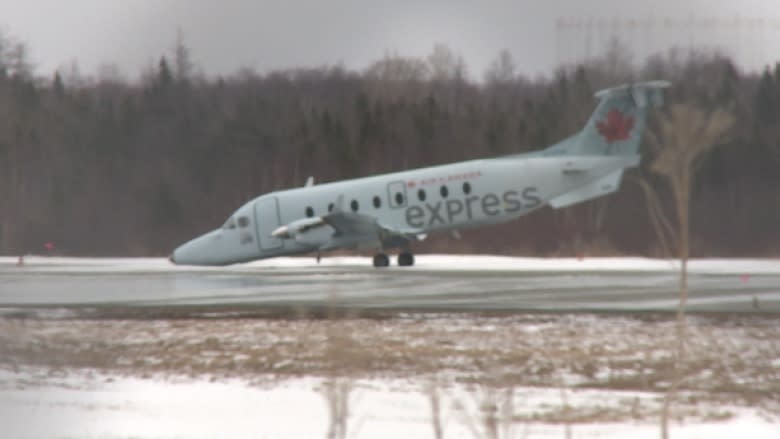Air Canada Express passenger says plane spun out after Gander crash landing
One of the passengers aboard a small plane that crash landed at Gander International Airport in Newfoundland and Labrador last night is questioning the decision to land the plane given the snowy and windy weather.
Kris Ralph was among 14 passengers and two crew on Flight AC7804, operated by Exploits Valley Air Services (EVAS). The plane was en route from Happy Valley-Goose Bay when it crash landed around 9:30 p.m. NT Wednesday.
Three people were sent to hospital for observation. All have been released.
An official with Central Health, the regional health authority, said there were no "serious physical injuries."
According to Ralph, passengers were told it was a 50/50 chance they would be able to land in Gander, and if it was unsuccessful, the craft would instead head to Deer Lake.
"We found out after that we were the only plane to even attempt to land in Gander the whole evening because of the weather," Ralph told CBC News.
A spring snowstorm hit eastern and central Newfoundland on Wednesday.
An Air Canada spokesperson said initial reports suggest the Beechcraft 1900 sustained damage to its landing gear when it touched down.
Knew they were in for a rough landing
An Environment Canada meteorologist told CBC's St. John's Morning Show the height of the storm would have occurred just before the plane landed.
Ralph said the passengers knew it would be a rough landing, but didn't realize what was in store.
"Right before we really pitched down, I think everybody knew … it was going to be rougher than usual for sure," said Ralph.
"We all knew it was going to be a rough landing, but we didn't realize that it was going to hit that hard."
Ralph said there was a lot of turbulence as the plane attempted to land, adding it was "a lot rougher than any experience before."
"As we struck the runway, it hit hard on the front and I suspect that the landing gear on the front is what collapsed. It put us into a 360; we spun around," said Ralph.
When the nose of the craft struck the runway, Ralph said one of the propellers was knocked off the plane.
"I believe the second seat back from the front there was part of the wing tip in through the side of the plane; it had bashed in the side of the plane," he said.
"I'm not sure if it completely penetrated, but it does have a fair bit of damage done to one of the windows on the right hand side."
Of the passengers and crew members on board, three people were injured, but able to depart the aircraft on foot, according to an airport spokesperson.
Air Canada said the remaining 11 uninjured passengers were provided with hotel accommodations.
Response questioned
According to Ralph, the passengers and crew had to stand outside in the blizzard conditions and wait about 20 minutes for someone to arrive.
"If [the weather] was too bad last night that there was no cabs available to come get us to bring us to the hotel, is that really a good situation to land a plane?"
However, the Gander Airport Authority said it's pleased with its response, adding it "did everything it could to help passengers in an immediate manner."
"I think we did a great job," said Brian Hicks, the airport's safety manager, saying all available equipment was used to get the passengers.
Hicks added the Gander airport is "a lifeboat for the North Atlantic," which is used to dealing with emergencies and urgent landings.
"Emergencies at Gander Airport — it's certainly what we do here."
Runway conditions were reportedly OK to land at the time, and the decision about whether to land is left up to the airline.
"From all my experience here at the airport, the runway conditions weren't bad at the time," said Hicks.
"It was a very windy night, and snow, but our guys we're doing their snow-clearing operations."
EVAS Air Services has declined interview requests with CBC News.
One runway remains closed Thursday, as the plane remains on it.
Meanwhile, Transportation Safety Board members have arrived in Gander to begin their initial assessment of the accident site.
Mike Cunningham, regional manager of air investigations for the Transportation Safety Board, said the aircraft will most likely be moved Friday morning.
"The nose gear has collapsed for some reason and that will be one of the key things that we start to gather information about," Cunningham told CBC News.
"The weather at the time was acceptable I think as far as the limits went but it was quite gusty."


